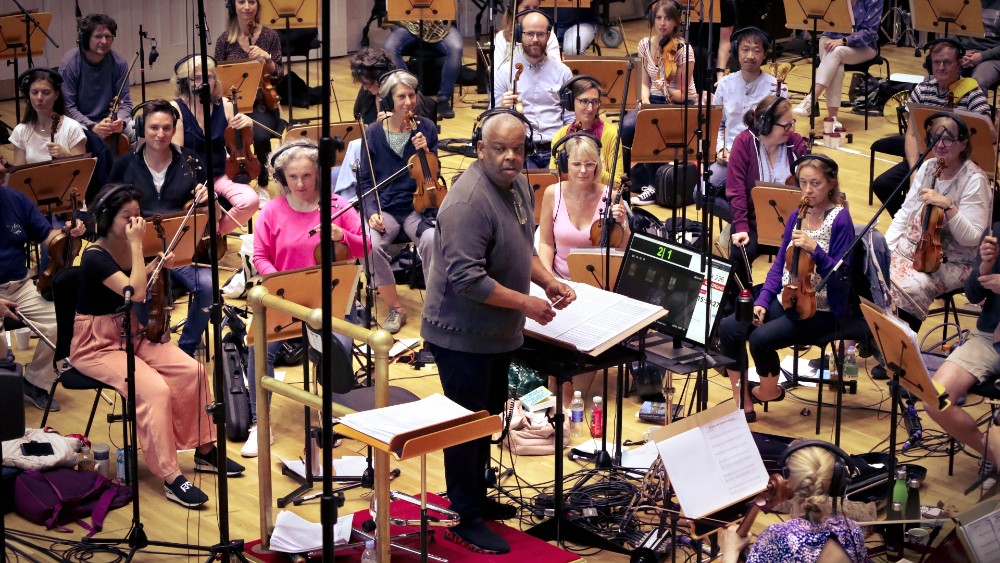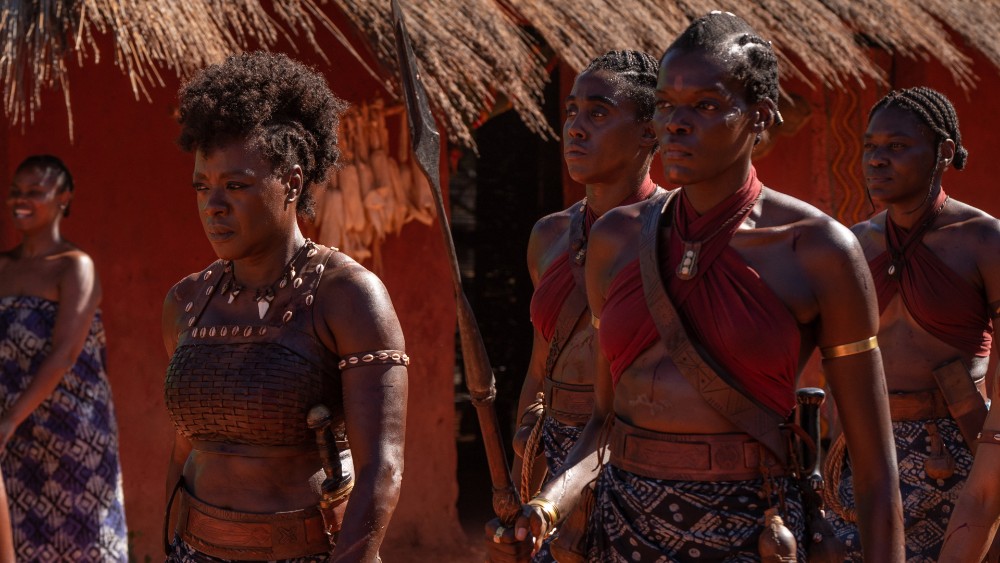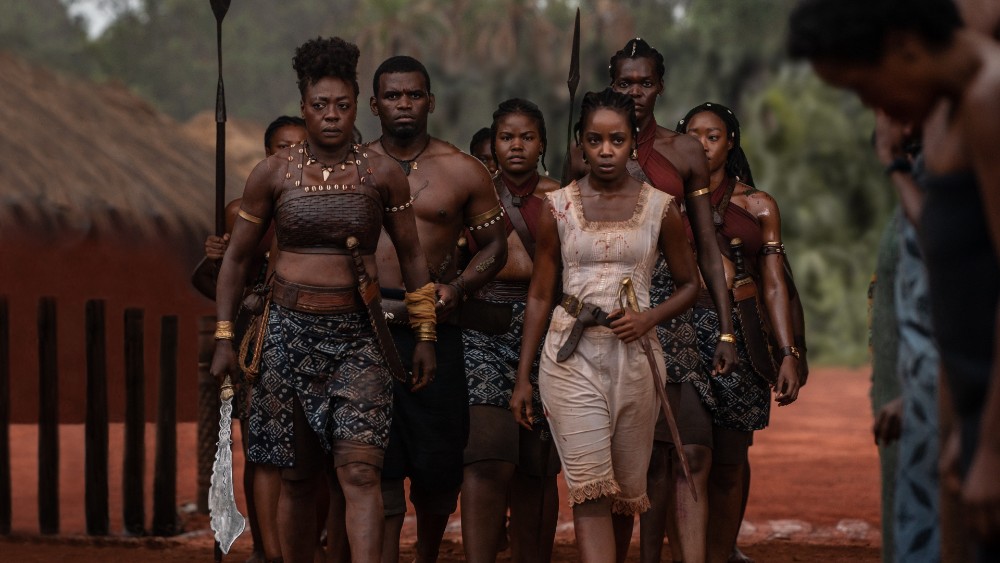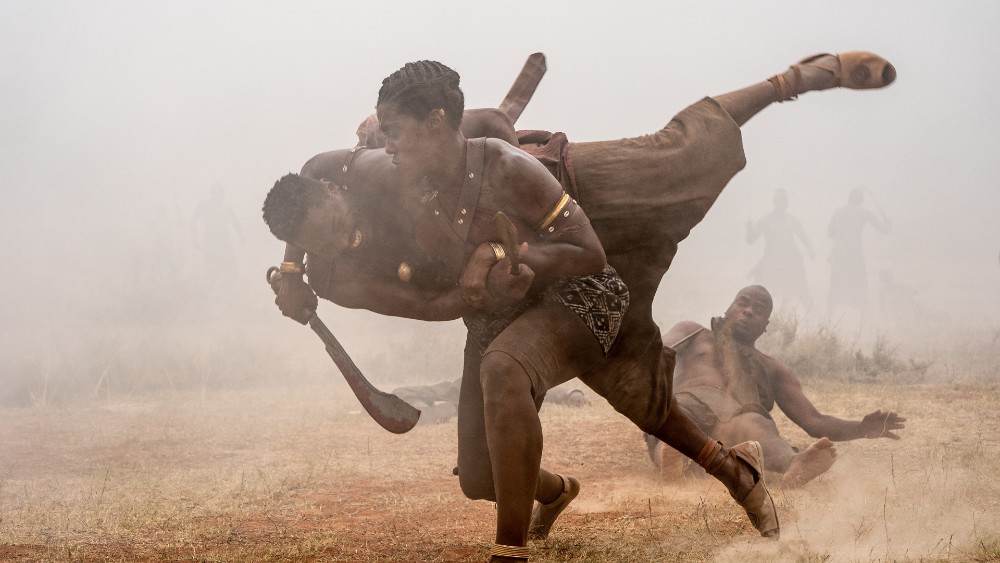Renowned Grammy-winning jazz trumpeter Terence Blanchard has been scoring films and television shows going all the way back to Spike Lee’s Jungle Fever in 1991. That partnership has led to a pair of Oscar nominations for Blanchard, for 2019’s BlacKkKlansman, and 2020’s Da Five Bloods.
Blanchard returns to the Oscar race this year with his score for Gina Prince-Bythewood‘s The Woman King, which marks a new high for the composer, who has an amazing ability to delve into many different musical genres and styles. It’s an epic orchestral soundtrack that matches the action and performances Prince-Bythewood was able to elicit from her actors, including Viola Davis, who just earned the seventh individual SAG Award nomination of her career for the Sony film.
Set in the early 1800s, the film finds Davis playing General Nanisca, the leader of the Agojie, the women warriors of the African Kingdom of Dahomey who were in the middle of a battle with a neighboring tribe when a young orphan named Nawi (Thuso Mbedu from The Underground Railroad) arrives hoping to join the Agojie in their fight.
Last week, Below the Line hopped on Zoom for another terrific interview (our third) with Blanchard, who as it so happens also scored Prince-Bythewood’s very first feature, 2000’s Love & Basketball, so The Woman King served as a rousing reunion for the two of them. Read on to learn more about it:

Below the Line: I know you scored Gina’s first film, Love & Basketball, but had you worked with her since then?
Terence Blanchard: I worked with both Reggie [Rock Bythewood] and Gina on a TV show called Shots Fired, and then me and Reggie are actually working on a show right now, the second season. It’s called Swagger.
BTL: How did Gina find her way back to you? I know she’d been wanting to do a big epic like The Woman King for some time, and this one connected with her. But when did she first approach you? Was it before shooting started?
Blanchard: Before she started, she just called me up. She gave me the script, and we started talking about it. We actually had a meeting at my house, not here in New Orleans, but in L.A., and we just kind of went from there. Then she started shooting, and she had [South African Composer] Lebo M. write a couple of things, but then she needed me to help her with one or two things. We did that, and then we kind of just dove into it. Once she had a first cut close to what she wanted, she had me come to her office to view it, and I was blown away. I was just taken aback by the beauty of it. It was interesting because I told her, being a lover of film, and being an African-American, ‘this is the type of film I’ve been waiting to see for decades.’ It’s something that’s done on African culture, but it’s done in such a way where it’s elegant and beautiful and very respectful, and then the story itself was just a powerful story. So all those things combined had me really excited to work on it.
BTL: Had you written any themes or any music at all for her to start editing to?
Blanchard: No, not at all. I don’t wanna say “always,” but I try to resist that urge, because a lot of times, it’s just based on images in my head. Even though you can get excited about something, I try my best to wait to see something. I’ve just had too many experiences where the images in my head don’t match what the final is, ’cause I’m creating my own movie. The other part of it that’s always like, really, really interesting to me, is just how it all comes together differently, because when you read a script, you’re reading it at your own pace. You’re hearing the inflections that you’re creating. When you start to see all these other great performances just bring it to life, then it just kicks into a whole other gear. [So] I try to wait until I [can] see something, and that’s what I did with this. I actually started coming up with the theme from the scene where the Agojie are coming back to the kingdom after that first battle.
BTL: Did Gina end up editing the film to temp music, or does she edit with no music at all?
Blanchard: No, they had a lot of temp music in there ’cause they needed to show it to [the] studio. Temp music has never really bothered me too much. Being a jazz musician, we always change shit anyway. [chuckles] So, temp music has never really bothered me. The thing about temp is that it gives me an indication of what the director is hearing or where they want to go. It’s not the end-all-be-all, because sometimes you hear temp stuff, and you go, ‘I know that doesn’t work, but let me try to figure out something that will service the story.’ She was really great about all of that.
The thing that’s beautiful about [Gina] is that she’s very smart, she’s a very brilliant filmmaker. She has a keen idea of what it is she wants to do, but she’s also open [to] discussion about ideas — in my case, musical ideas. We were talking about something, and I was gonna give up on the issue, because I know sometimes directors fall in love with an idea, and she said, ‘Well, no, convince me.’ It was something about the way she said that, that let me know she was open to ideas, and that she was trying to do what was best for the film. Once I presented my case — I don’t want to say plead — she was like, ‘Okay, cool. I can see that,’ and we kind of just went from there.

BTL: Do you usually demo things out using MIDI or just write things out manually?
Blanchard: It depends. I mean, for her, I definitely demo’d a lot of stuff, because a film of that size, she just wanted to have a clear idea of what the music was going to be. The funny part about it is that some of those choir samples that I use, people rave about ’em but they only go but so far. It was interesting, me trying to convince her that when we had real voices, it was going to be a lot different. She went on trust, I gotta give her that. Once we flew in some singers from New York, some opera singers that I had worked with before, man, they just kind of put it in a whole ‘nother realm, and then [jazz singer] Dianne Reeves came in and just blew our minds with what she did.
BTL: Do you tend to do a lot of scores that are as vocal-driven as this one?
Blanchard: No, I don’t get a chance to do that that much. Every now and then. When I did Red Tails, we had a choir, which is kind of hilarious on that film because we were in Austria. [laughs] George Lucas wanted to have an arrangement of “America the Beautiful” until we heard those accents singing. [laughs] Yeah, that wasn’t going to work. But no, I don’t get a chance to write for [a] choir. I started off early in my career with Spike [Lee], and we had a choir, I think, for Malcolm X, and then I had one for Red Tails. There’s probably something else in there that I can’t think of, but it doesn’t happen too often.
BTL: Did you have to do any kind of research into the cultural aspects of the music? Obviously, The Woman King takes place in 1800s Africa, and people may not know what that music might sound like, but you juxtaposed your music with more traditional stuff, right?
Blanchard: The interesting thing about it is that I already had experience [in] that area. I had a student who became a guitarist in my band, and now he’s actually been playing with Herbie Hancock for the last 17 years. His name is Lionel Loueke — he’s from Benin, which is Dahomey, so it’s the same area. Over the years, while he was in my band, we would always talk about stuff, and he would always play me things, so I kinda learned some things about the rhythmic heritage there, if you will. I was on tour with Herbie while I was writing the score for this. We talked, and he would play me some things, so that really helped me out a great deal. But in terms of doing research, I already had a passion and love for that music anyway.
The thing I felt was the most important was, Gina initially wanted to have all African instruments, and I went, ‘Okay,’ but I felt that wasn’t gonna service the film in a way that I thought it should be serviced. There’s this notion that orchestral music is only European music. The thing I was trying to tell her was, that’s not the case. That’s what has been an accepted norm, but that’s not necessarily a factual truth. I felt it was really important to have all of those colors to broaden the scope of the film. What I tried to do… and I’ve been doing it in my writing and my music, just in general… I’ve been trying to do what [Igor] Stravinsky, and all those other composers had done — just take our folklore and expand it into that realm of music.
That’s one of the things my teacher, Roger Dickerson, talked to me about when I was a kid. He said, ‘You’re gaining experience doing this stuff, but now you need to start thinking about how to bring that culture into that realm of music,’ because it’s not just one thing. Those are instruments that should be allowed to tell stories in a very broad and very detailed and very sophisticated way. That’s what I tried to do with this score.
BTL: I liked a lot of the drums and percussion work. “Enemy Village” starts with this percussive instrument that I couldn’t quite identify.
Blanchard: I have to think about the scene, but some of the percussion is stuff that I layered here in my studio. [For] some of it, we had some African musicians in L.A. come out and track some stuff, and then some of it is a mixture of me taking some of those things and manipulating them in the computer.

BTL: Do you usually have musicians come over to record in your studio in L.A. rather than record in New Orleans?
Blanchard: No, I’m in New Orleans right now. Some of the stuff that you heard, like that opening scene, that percussion was me tracked here in my studio — with a lot of editing, by the way. [laughs] I’m not really a great percussionist. Once we got into the battle scenes, I did some demos, but we tracked it with some real musicians that we found in L.A. while I was still on tour, which was kind of weird because I couldn’t be there, but I was there on Zoom.
BTL: Just going by the soundtrack, this score has so many cues and such widely different instrumentations. How much time are you actually spending at the studio recording the orchestral stuff?
Blanchard: Ed, that’s one of the things we don’t talk about too much, because it was crazy, dude. They had a couple of screenings for the film, and they decided to have a third screening for the film, but they didn’t change the due date, because we were trying to get to TIFF, and we needed stuff done. Literally, by that time, Gina had only heard a third of the score, in terms of the demos. When we got to the studio, I was literally set up in another room with an entire system — monitor and everything — and I was writing cues. We had the orchestra in another room, recording the music. Luckily, we had enough stuff to get started, because I didn’t rewrite everything.
There were a lot of cues that I needed to make modifications to because Gina hadn’t heard [them]. I was literally writing in one room, emailing the stuff to the copyist in L.A., [and then] they would create the music [and] email it back to us. We’d print it out, and the orchestra would go and record it, and that was the process. It was so hectic. I literally slept in the studio for two days, trying to make sure I could keep up [with] the pace of everything. And we got everything done. We got it right under the wire. Talking about feeling like a racehorse led out of the gate, dude. It was non-stop, but it was well worth it because it’s a great movie. It’s a powerful story. It’s a once-in-a-lifetime experience, man, and I wanted to do the best that I could for it.
BTL: There’s also some stuff from the South African choir, which I assume is a lot of the stuff that’s performed in the movie by them. Had she already recorded that before production started?
Blanchard: No, some of that stuff they recorded live, but those are the songs that Lebo M. had done, and one of them I had kind of done some stuff for — I can’t remember which one. That was stuff that they wanted to record on screen, all the war dance stuff and those things. Yeah, they did that live.
BTL: But you had to work around that stuff while you were writing the rest of the score, so was that difficult?
Blanchard: No, like I said, I had a passion for that music for a long time, so when it came time for them to ask me about finishing one of the songs, I was like, ‘Oh, that’s no brainer.’ It worked out great, and I’m glad she shot it the way she shot it because it was really effective in the film — the war dance stuff. All that stuff was just really powerful.
BTL: Do you have an orchestrator or someone else you use? I know you conduct yourself, but do you have someone else you work with when you can’t be there or have to do something via Zoom?
Blanchard: Howard Drossin and Robert Elhai are two guys I’ve been using. Howard I’ve been working with for a long time, but because of the amount of work and the speed that we needed to work at, we brought in Robert, and he also did a great job, too.
BTL: Are you generally able to go to the sound mix to put your two cents in, or is that not something that’s possible these days?
Blanchard: No, I never get a chance. I’m the type of dude… I’m either teaching, scoring, or playing — one of the three — so I never really get a chance. But for this, actually, I did get a chance to go a couple of days to hear some stuff, now that I remember. I did get a chance to go to the — I guess that was the final [mix], ’cause we were trying to get everything done for TIFF. When I got there, it was really fascinating because that Atmos system, man, makes you want to have that shit in your home. It’s just incredible, because the way those guys [work], and what they did for this film, I thought was really sophisticated. The Atmos is not there to make you turn your head or anything like that. It’s just there to immerse you in the experience, and I thought that was truly amazing.

BTL: Did you go to the film’s TIFF premiere at Roy Thomson Hall? I’m not sure they have that theater fitted for Atmos.
Blanchard: Yeah, I was there, but I don’t know if that was Atmos. I’m not sure. I don’t think it was. It didn’t feel like [it] in the mix. We did a Q&A after a screening [on] the Sony studio. I can’t remember the name of the small theater in there, but the sound in that theater… my God, it was incredible. I was so jealous. I was like, ‘Man, I need to hit the Lotto, so I can bring this to the crib.’
BTL: Last time we spoke, we were still very much in the early days of COVID, and things have since settled down a bit. Have you been able to go back out on the road, and do you feel better about things getting back to normal?
Blanchard: It goes up and down, man, because just as you feel like it’s getting normal, there’s another outbreak. My daughter lives in New York, and right before she came here to visit for the holiday, she caught COVID for the second time. And then we knew of other people [who we were] supposed to have dinner [with and we] couldn’t do it because they caught COVID, so it’s still a mixed bag of tricks.
When we were on tour with Herbie over the summer, we tried to keep ourselves in a bubble. I know it’s frustrating for fans, but Herbie is 82 years old, and we didn’t want to get him sick. We weren’t signing a bunch of autographs, going out into the public, doing a bunch of meet and greets, and stuff like that. That part of it is still a little weird, but the wild thing is that there is still [a] yearning for us to congregate. Every place we played over the summer was packed. We played in Glasgow, and man, there were like 30,000 people at this festival. There were 10,000 [people] at North Sea, [and] 5,000 in Paris. It was incredible to see that yearning [from] people to experience live music as a group. It spoke a lot to me about just human nature in general.
BTL: Have you ever performed any of your music scores live, either to picture or just playing the music? The Woman King seems like one of those movies that if you could ever make it happen, and make it work in terms of time and money, would be pretty amazing to do that with.
Blanchard: That shit terrifies me, dude. [chuckles] Because you gotta remember that I conduct, but I’m not a conductor. When it comes time to do film, I’m comfortable in the studio because I know we can start over, but I watched David Newman at the Hollywood Bowl [conducting Jurassic Park], and it was so interesting to hear. I loved it. They told me they use a lot of streamers to help keep them on track with the film. I’d have to do it once or twice, man, before I [could] feel comfortable with it.
BTL: Fair enough. I’ve asked a few composers about this, but I’m curious if there was any movie you’ve seen or score you’ve heard recently that you were just blown away by.
Blanchard: That’s always a hard one because you’re always thinking about what you would do. I mean, listen, there are so many composers… I love Harry Gregson-Williams’ work, [and] Nicholas Britell. Thomas Newman, obviously. Whenever I hear their music, I’m always inspired by what they do, because a guy like Thomas Newman… I always use The Shawshank Redemption as a reference, because I think that film is phenomenal for so many reasons. It’s not the typical type of film you think would get made in Hollywood. When it was done, his score was so unique to what the images were, but that’s the thing I’ve always loved about Tom. That film blew me away for so many reasons because there had to be a lot of confidence on everybody’s part to allow everybody to do what they did for that film. I always said I wish I could have heard the pitch to the studio for that film. [laughs]
BTL: Sometimes those kinds of movies just slip in and get made, and then they become classics, as that one is.
Blanchard: Think about that film. If you were to describe that film, most people would go, “Nah, I don’t want to see that,” but it’s phenomenal. There’s a film me and my wife watched this year, and I was shocked [by] how much I loved the film itself, and that was Women Talking. It was a fascinating exploration [of] those subjects. Man, it was something else, too.
The Woman King is now available to buy or rent on all major digital/VOD platforms, as well as on Blu-ray and DVD. Additionally, Sony is re-releasing the film in theaters on Jan. 13. The soundtrack is currently available via Sony Music and on most streaming platforms.





